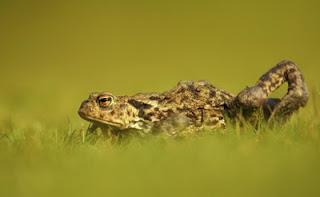From
shy to spry; March males are all-singing, all-dancing
Brits
aren’t known for making a song and dance about things, but that’s not so for
our wildlife, which is emerging from the chilly winter this month to be at its
loudest and most flamboyant.
Male
birds are at their most colourful right now, the way they moult and the
brighter spring days mean their plumage appears more vivid and their patterns
and markings are more obvious. Many male songbirds – robins, blackbirds
and song thrushes among them - are competing to sing the loudest and longest,
all in an effort to attract a mate for the start of the breeding season.
Common frogs and toads are joining the cacophony too, croaking to attract a
partner.
Ian
Hayward, RSPB Wildlife Advisor, said: “It’s a fever of activity in our gardens
and parks at the moment. Birds are displaying brighter plumage, we’ve
already received reports of frogspawn in some garden ponds and a few warm days
will bring more colourful flashes of bees and butterflies zipping through the
air. This chorus of singing, buzzing and croaking is almost a sensory
overload, but of course there’s real purpose behind it; it’s all geared towards
pairing up and mating.”
Away
from gardens, hares are active and indulging in their classic spring ‘boxing’
behaviour. Once thought to be males boxing each other to win a female,
it’s now known that boxing is actually the female hare fighting off the male’s attentions. Meanwhile, paired-up great crested grebes
are performing their elegant spring mating ‘dance’ mirroring each other’s
movements on the water to help them bond ahead of breeding.
Ian continues; “The males of the wildlife World will be pulling
out all the stops this month to bag a partner to breed with. It’s a
fascinating time to be outdoors experiencing these often shy creatures dancing
and singing for all they’re worth, showing off their best moves. Other species
like hedgehogs, grass snakes, and even some bat species are popping out of
hibernation right now too.”
To help
make a home for nature in your garden this spring, visit www.rspb.org.uk/hfw or get close to
spring wildlife at one of the RSPB’s Date with Nature events www.rspb.org.uk/datewithnature


No comments:
Post a Comment